Source: © Learn-chinese.online
Mandarin Chinese is reputed to be a difficult language to learn. Although this view is exaggerated, it is not entirely false. Learning Mandarin Chinese therefore represents a certain investment in time and energy. It is therefore natural to wonder why it is interesting (sometimes necessary) to learn Mandarin Chinese. After analyzing the different possible reasons and motivations, it is of course necessary to ask how to go about optimizing learning both in terms of time invested and the quality of skills acquired. This article aims to be a clear and complete analysis of these two questions.
Why learn Mandarin Chinese?
Here are the different reasons that lead to learning Mandarin Chinese as I have encountered them among my students and pupils:
- Given the current situation in the world and the place of the Chinese economy in the international context, one of the first reasons to learn Mandarin Chinese is indeed that of a professional nature. Mastering the language of the world's second-largest economy and especially the leading industrial power is not insignificant on a CV. Whether to join a company or to enter a prestigious school, Chinese is an often underestimated asset. The examples I have encountered in my teaching career are sometimes surprising: for example, this student who wanted to join an engineering school after a gap year (to have fun and not to acquire linguistic and cultural skills abroad...) and who was in competition with two other candidates for a single spot. This student had a slightly weaker file than the other two and had not even finished his Chinese course (2 years instead of the 3 for LV3 in France). But as he had already studied Chinese, he was the one who was selected. Similarly, in the police or the army, mastering Mandarin Chinese offers interesting promotion opportunities. The examples are countless, and anyone integrated into the professional world or higher education can confirm this.
- Another important reason for choosing Mandarin Chinese is the cultural aspect. It is true that the best way to understand a culture is indeed through its language. Fixed expressions, different lexicons, the way of expressing one idea or another differ from one language to another. Now, Chinese culture is of incredible richness, both in literature, painting, calligraphy, music, and all the arts in general. China even has an original medicine that is easily understood in Chinese, while it seems so strange when it is discussed in our Western languages. And we must not forget that China has a history that dates back to the second millennium before Christ on a territory larger than Europe!
- Another reason that leads to learning Mandarin Chinese is its difficulty. For some, this represents a real challenge that is well worth taking on. Personal pride obliges.
- The difficulty of Chinese is mainly due to its writing, which does not indicate pronunciation like an alphabet. Learning Chinese therefore requires particular gymnastics that work the right brain independently of the left brain. I have heard (but I have little information on this subject; if you have any, please let me know via contact) that dyslexic people have been able to resume their studies thanks to learning Chinese. The mental gymnastics required for learning Chinese would be like therapy.
- Finally, another reason to learn Mandarin Chinese is the humanist reason. Understanding the other and seeking to communicate in a sincere and respectful dialogue is an essential condition for peace and mutual understanding. Now, learning the language of the other, seeking to know his or her culture, is indeed the first step in this dialogue. This is (unfortunately!) a reason rarely mentioned for learning Chinese. However, there are more than 1.3 billion Chinese. They often feel misunderstood or even humiliated by Westerners. Moreover, China is already a superpower, and experts agree that it will not stop there. Learning Chinese is therefore not just a "plus" that one can look at selfishly for professional promotion, but rather an opening to the other, who seems so distant but is in reality so close.
How to learn Mandarin Chinese?
To effectively optimize the learning of Mandarin Chinese, it is necessary to establish a learning strategy right from the start. This strategy is defined by the rules for learning a foreign language in general and especially by the specific difficulties of the Chinese language.
Definition of problems related to learning Mandarin Chinese
A language is first spoken before it is written. It is therefore appropriate to start by learning the essential elements of meaning: words. It is then necessary to learn how to combine these words to produce understandable statements: sentences. This is where grammar comes into play. For this, it is necessary to memorize "model sentences" that will engrave these structures in our memory and allow us to reuse them quickly in an authentic context. It is enough to change one or two words in these model sentences to be able to make a great variety of different sentences. These automatisms are therefore very important. Finally, it is necessary to learn the particular expressions of the language, which are often closely linked to the cultural context.
Another very important thing for learning a foreign language: it is necessary to have precise objectives. One is often disoriented by the variety of methods and their content. It is therefore necessary to have precise objectives both in terms of vocabulary lists and grammar points and linguistic skills. These objectives are often defined by language certificates (Ielts for English, HSK for Mandarin Chinese, etc.). Analysis of the results of the PISA tests shows that the countries with the best results, among other things, have curricula with precise objectives. We observe in our Western countries an opposite trend due to certain "pedagogical fads."
We have just defined the general learning rules for a foreign language above. Now we need to specify what the specific difficulties of Chinese are.
The big problem of learning Mandarin Chinese is that the main difficulties are all at the beginning and it is difficult to avoid one or the other.
The first difficulty is pronunciation. Mandarin Chinese is not a rich language from the oral perspective. There are not many phonemes. However, some do not exist in French, and above all, the syllables in Chinese are accented: each syllable can have four different intonations (plus the absence of intonation), which consist of a variation between low and high. This does not exist in French, and it takes quite a bit of time to train the ear and even more to be able to reproduce them.
The second difficulty is linked to the first: as Chinese characters do not indicate pronunciation, a phonetic transcription called pinyin is used. A century ago, each country had its own phonetic transcription of Mandarin Chinese. In 1979, China and the ISO (International Organization for Standardization) officially adopted pinyin (which had already been approved in 1958). However, this transcription in Latin characters is not pronounced like French. For example, the "r" is pronounced like our "j", the "i" is sometimes pronounced "i" and sometimes "e", etc. It is therefore necessary to learn how to read pinyin correctly from the very beginning.
In addition to the difficulties of the spoken language, there are those of the written language. It is necessary to learn a new writing system, very different from ours. Characters are numerous, and it is difficult to remember them all.
Finally, the grammar of Chinese, which is very simple and logical in itself, does not resemble ours. There is no subject inversion for questions, no conjugation, etc.
Setting up a learning strategy for Mandarin Chinese
First of all, it is necessary to learn vocabulary. It is surprising to note that many language methods start with the lesson text. The learner will therefore logically go a few pages further to look for vocabulary and do a kind of back-and-forth between the text, vocabulary, and grammar. All the difficulties are thus accumulated, and this is often discouraging. It is therefore necessary to learn vocabulary first, even if it is not retained 100%, the fact of having already seen it will facilitate the rest of the learning process.
It is the oral vocabulary that needs to be learned first. One should not read the pinyin (the phonetic transcription) right away, but first listen carefully to the recording and repeat each word trying to imitate the Chinese speaker. Then, one can analyze the pinyin and discover which sound corresponds to which transcription.
In order to facilitate the learning of oral vocabulary, the website Learn-chinese.online offers various dynamic exercises. For example, associations of recordings with pinyin transcriptions:
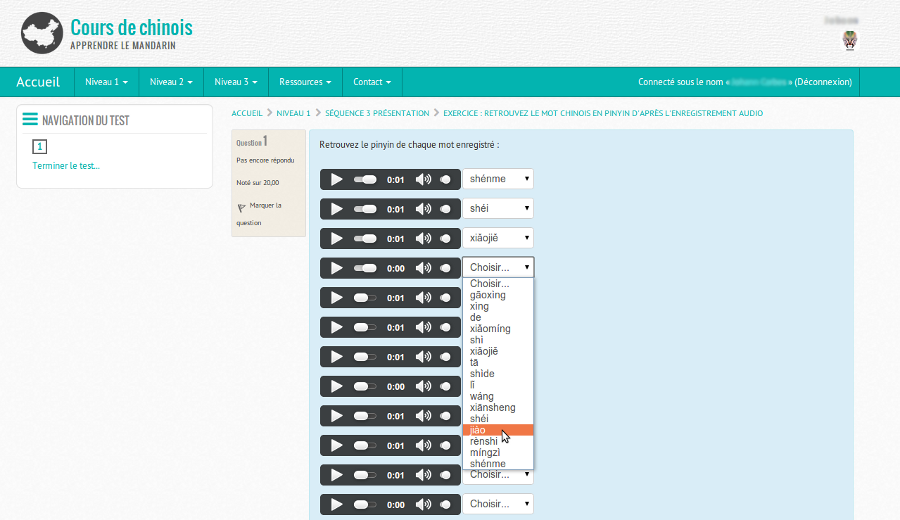
Then, an exercise to memorize oral vocabulary:
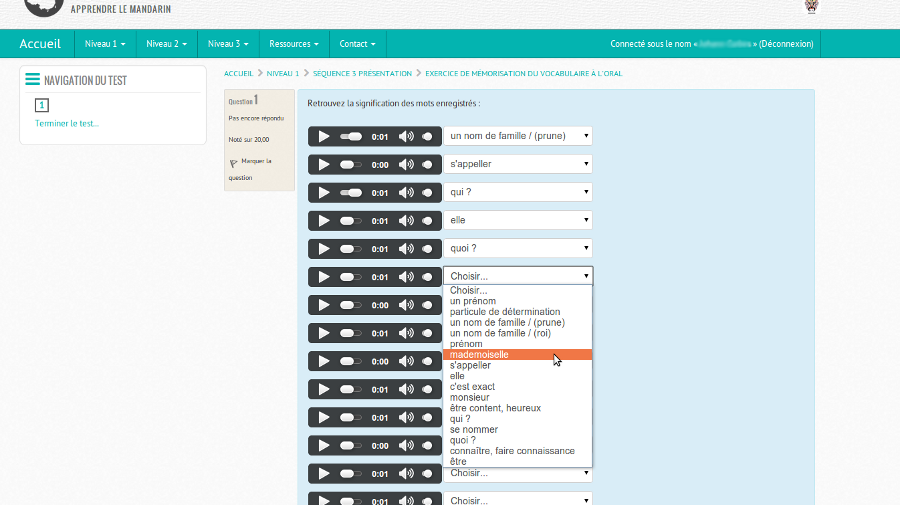
Next, it is necessary to learn writing. In Chinese, a word can be composed of one, two, or three characters, sometimes more but it is rare. It is preferable to learn each character separately. For each character, it is necessary to remember its meaning, its pronunciation, the order of writing of the strokes, and the direction of each stroke. The order of writing and the direction of each stroke follow precise rules: the rules of Chinese writing. Care must be taken at the beginning to respect the order of the strokes to not make the characters unreadable later. By the end of level 1 of the Mandarin Chinese courses, the order of writing becomes natural. A Chinese character is composed of fundamental characters called "key", "radical", or "graphic element". It is strongly recommended at the beginning to learn these graphic elements as this simplifies the memorization of characters later.
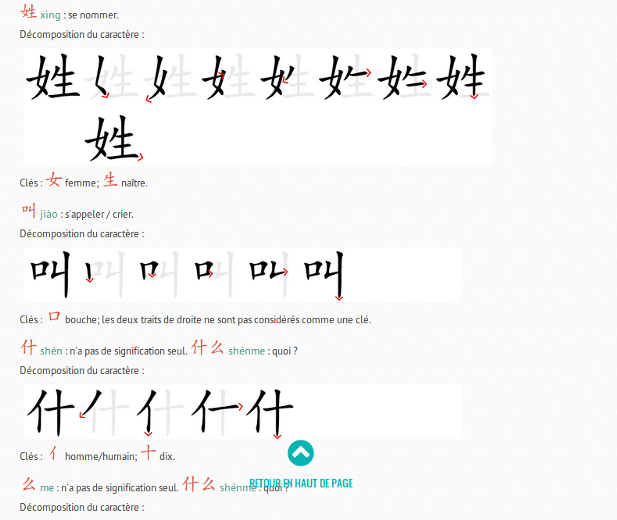
As for learning oral vocabulary, Learn-chinese.online offers various dynamic exercises. For example, associations of words in characters with French:
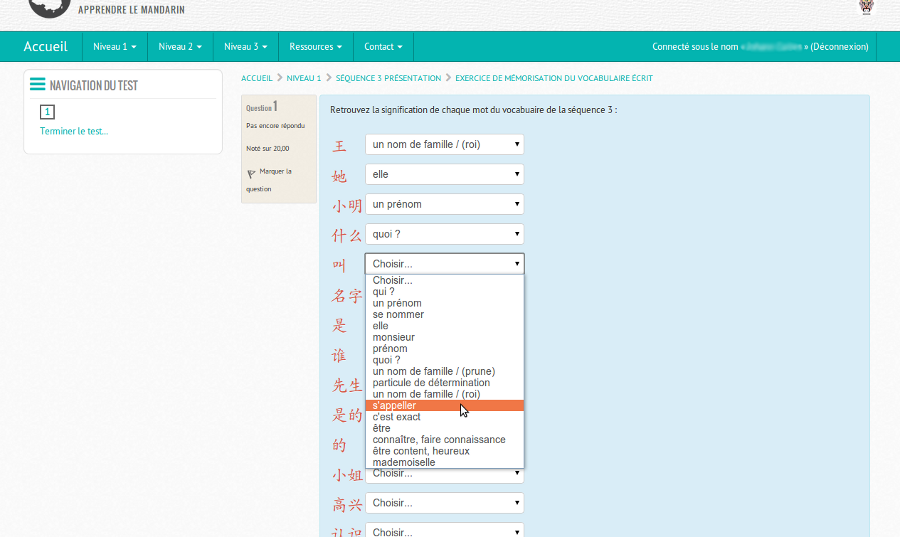
As well as other exercises such as character-pinyin or character-audio associations.
These dynamic exercises make it much easier to memorize vocabulary because the brain's gymnastics are guided by the interactive aspect of the website. It is no longer necessary to force oneself in front of an inert sheet of paper.
An important exercise at the beginning of learning Chinese is the copying of lines of characters. For each sequence, the website Learn-chinese.online provides writing grids to download and print with all the characters of the sequence:
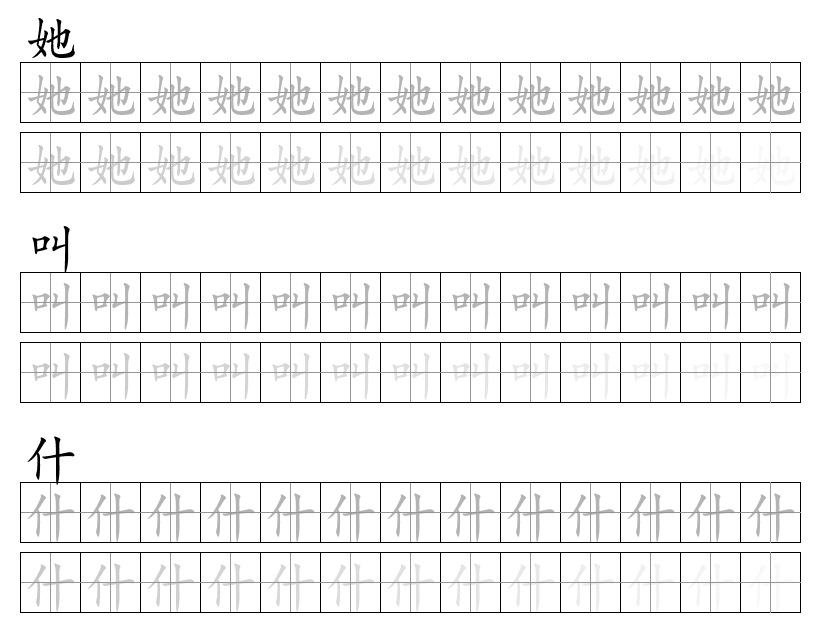
When the vocabulary is assimilated, one can move on to grammar with clear and precise explanations:

Then, it is necessary to memorize model sentences:
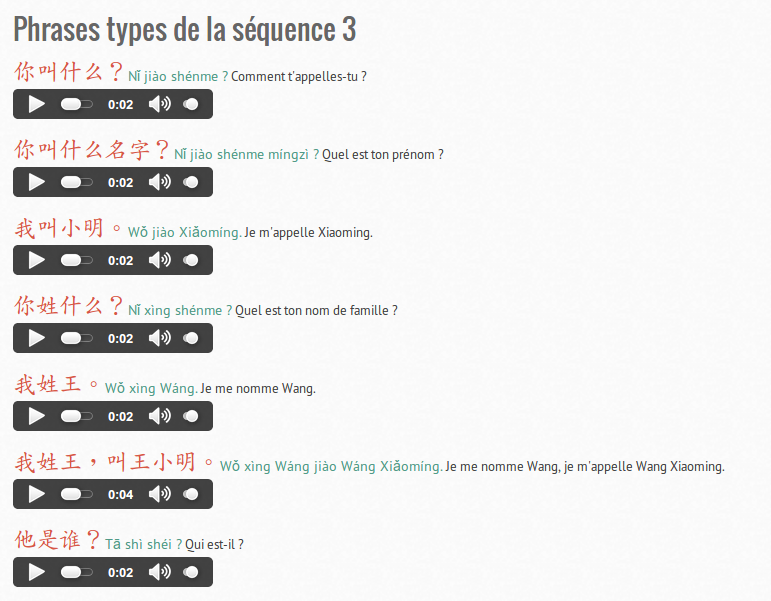
As with vocabulary, the website Learn-chinese.online offers dynamic exercises to memorize model sentences orally:
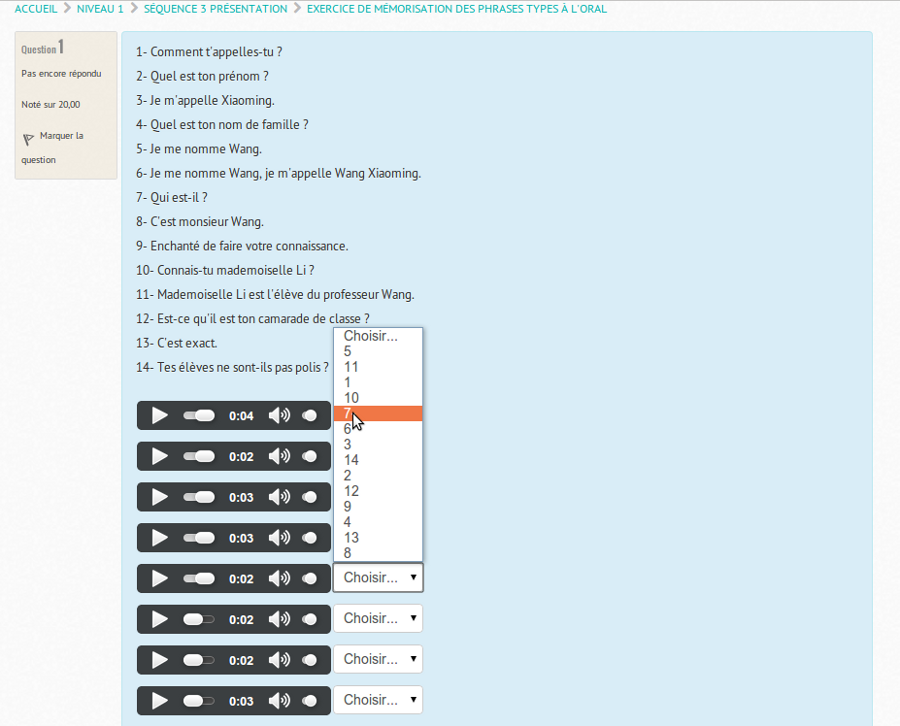
and in writing:
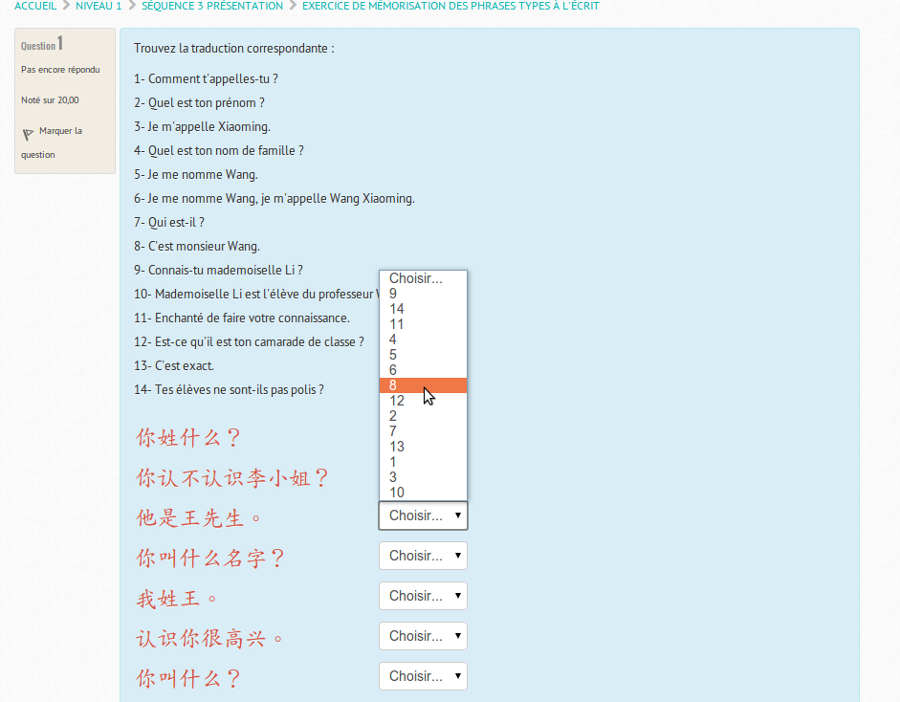
One must then combine one's knowledge by studying the text or a dialogue:

We also mentioned that it is necessary to have precise objectives to optimize one's learning of a foreign language. The website Learn-chinese.online has chosen to organize its courses based on the objectives of the Chinese language certificate (HSK), which is the best way to have one's level of Chinese recognized internationally. HSK is an objective test mainly based on multiple-choice questions. Its programs are very precise. Taking it year after year is an excellent way to verify (and especially to validate!) one's level of Mandarin Chinese.
This is why the website Learn-chinese.online presents synthesis assessments based on the HSK test model:

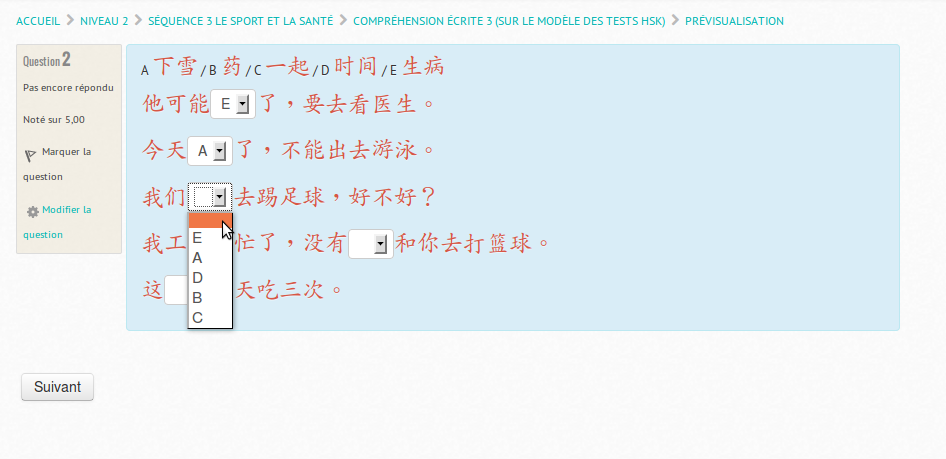
Each sequence of each level presents an oral comprehension assessment and a written comprehension assessment based on the HSK test model (except the first three sequences of level 1, as the volume of knowledge is insufficient to take a full test). This makes it possible to activate recently acquired knowledge, review knowledge from previous sequences, and practice for the HSK test for those who wish to take it.
